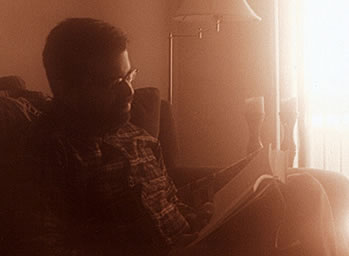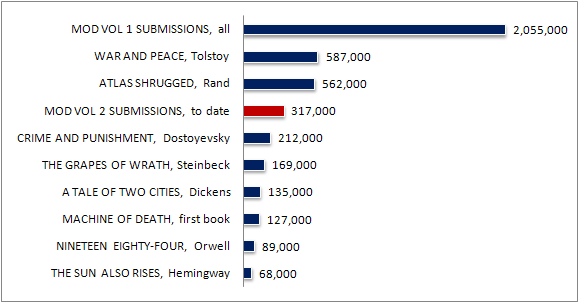Category ArchiveVol2 Updates
Answers &Vol2 Updates 03 Jul 2011 02:40 pm by Matthew
Can I submit a story? Yes, you can!

Flickr photo by TXMagpie
Every now and then, we get questions from folks asking us if it is true that they, as a member of some specific group, can submit a story for Machine of Death. Invariably, the answer to that question is YES.
You only have to meet two requirements to submit to the book: (1) You must be able to send us a submission written in English, and (2) someone (usually you — but not always) must be willing and legally able to sign a contract on your behalf. Here are some answers to specific variations on this question:
I’m a teenager… Can I submit a story?
Yes, you can! There is no age restriction on who can submit stories to Machine of Death. If you are considered a minor in the place where you live and if your story is accepted, you will probably need to have a parent or legal guardian sign the contract on your behalf. (In the U.S. and Canada, this will be true if you are under 18 years old.) As long as your parent or guardian is willing to do that, then there are no problems at all!
I’m a creative writing teacher… Can my students submit stories?
Yes, they can! The above answer about minor writers still applies, of course, but we also know that teachers sometimes have to be careful about sharing information about their students. If you’re a teacher who would like to submit stories on behalf of your students but have reservations about including their contact information, then please get in touch with us! We’ll gladly work something out.
This is the ONLY time when we’ll accept stories that don’t have the writer’s full contact information, and we WILL need full contact info from the submitting teacher so we can get in touch about our decisions. Also, if any stories are accepted, at that point we’ll need to contact the student’s parent or legal guardian to get a contract signed.
But look, basically the answer is: Send us a note, and we’ll work something out.
I live in a country that’s not the U.S. or Canada… Can I submit a story?
Yes, you can! We love getting submissions from other countries, and our first book included stories from writers living in the U.K., Ireland, Australia, South Korea, Argentina, Germany and Sweden. We’d love the second book to be just as diverse or more so. Your story will need to be written in some form of English, but otherwise your location is irrelevant.
There are occasionally some challenges in paying writers who live outside of the U.S. and Canada, but so far we’ve been able to work with all of our overseas contributors to find solutions that don’t result in massive fees. As long as you’re willing to be a little patient, we’re sure we’ll find a way to pay you too, no matter where you live.
I live in another country… Should I try to give my story a more mainstream (“generic American”) setting? Should I Americanize spellings?
Absolutely not! We encourage everybody to give their stories vivid, evocative settings that feel as real as possible. This could mean writing about the place where you live, or a place you’ve visited, or a place you’ve researched. It could even mean writing about a made-up place that you invented. But when it comes to settings, we prefer specific to generic! We are not afraid of settings that might fall outside the day-to-day experience of most of our readers.
Since places have their own vocabularies, there’s no need for you to Americanize your spelling or word choice, either. We have confidence that our readers can handle some regional variation from story to story. But if there’s a word or phrase that you think a wide audience might find confusing, feel free to explain it in your text.
I want to collaborate with another person… Can two people submit one story together?
Yes, you can! We’ll accept stories that are written by more than one person. Include contact information for all collaborators when you submit, but let us know which person we should communicate with primarily.
In the event that a story with multiple authors is selected for the book, you will each probably have to sign your own contract. The details of that may depend partly on the nature of the collaboration, however. The collaborators will then split a single fee in whatever way they choose to divide it amongst themselves.
May I submit as both an author and an artist?
Yes, you can! But we ask that you please keep the submissions separate, e.g. send an email with your story submission(s) and a separate one for art submission. If you don’t have an online art portfolio you can use a site like imgur.com to upload images, or just attach some jpg files to the email.
I submitted a story and then realized some minor error (a typo, I formatted the title wrong, something like that). Should I re-submit?
No, it’s fine. Now, you should absolutely double- and triple-check your submissions to ensure that you are presenting the best, most readable, most professional work possible — BUT if an error slips through we’re not going to chuck an otherwise great story out the window. We’d prefer to read perfect versions, but at this point re-submissions clog up our record-keeping enough that it’s less of a hassle to just overlook the typo.
Everything will be proofread before publication anyway, and if we think something (like a title) needs to be changed we’ll work with you on that, rather than turn down the entire story because of that.
If you have any other questions for us, use our Ask Us Anything form!
There are now less than two weeks remaining to submit your stories. If you need to run your work through a mental checklist to make sure it’s as polished as it can be, read our post about common short story pitfalls.
If you’ve already submitted, hooray! Thanks so much! We’re absolutely thrilled to see such a great response (over 500 submissions so far!) and we can’t thank you enough for taking the time to participate. We’re as excited to see MOD2 as you are!
Vol2 Updates 09 Jun 2011 12:49 am by David !
6 Ways to Keep Your Story’s Armor Intact

Flickr photo by Peter Engels
We want to love you.
This whole process, from 2007 till now, has given me an incredible respect for the agents, editors, assistants and interns who daily read manuscripts from authors, screenwriters, poets and everyone else.
If there’s one thing I’ve learned — if there’s one thing I want you, as a writer, to learn — it’s the bold words just above. We want to love you.
Think about how easy it would be if we said “We’d like to publish an anthology of about 30 stories,” and then the first thirty stories we read were all perfect in every way. Compelling narratives populated with remarkable characters, all with interesting points of view, each paragraph of prose self-assured and crackling with storytelling power. We’d finish each story and say, “Wow. The world needs to see this!” After reading thirty stories, boom! We’d have our book.
It would be so easy!
Well, that’s what we want to happen. That’s what we wish would happen! It’s what everybody wants to happen — every agent, every publisher, every editor. Nobody has it out for you. We all want to love you.
You even do it as a reader, right? You open books with high hopes for what you’ll find. You want to be blown away by every word!
But it doesn’t always work that way, does it?
Charging boldly into battle
Picture yourself, the reader of a story, as a warrior riding into battle. It doesn’t matter whether you’re the most powerful editor in New York or a recluse at home in an armchair. You’re a warrior ready to engage with this piece of fiction.
Hopefully you’re fully armored, in great health and sitting astride a fresh steed, although we know that’s not always the case — maybe you’re tired, or on a plane, or stressed, or maybe you’ve just read 600 stories on the same theme in the last month. It’s possible for your armor to be a little chipped from the start.
Regardless, you charge into the pages with every intention of slaying the mighty beast and thrusting your lance through “The End” like it’s the heart of a fearsome dragon. You want to come to rest victorious, breathing hard but invigorated, utterly energized by the experience and feeling on top of the world thanks to the wonderful journey you’ve just been on.
So you start! You gallop full-speed into the first paragraph, and then the second!
Then a stone hits you. A paragraph is poorly-worded.
An arrow stings your shoulder: a character does something unbelievable.
A mace knocks your helmet off: the internal logic of the story is violated.
And it only gets worse from there! A snarling wolf tears your shield from your hand: the plot goes completely off the rails! Your horse is creamed by a cannonball: the ending of the story comes out of the blue! You’d hurl the book across the room if you weren’t face-down in the mud on the battlefield! The metaphor falls in strips to the bloodstained muck like the tattered standard of your foully murdered King!
The story can fight back. The story can kill the knight. The battle can be lost.

“Ow! Those adverbs are PRICKLY.”
I don’t want any of that to happen. I don’t want to read stories that fight back, that refuse to let me enjoy them.
When we, as readers, start to read a story, it’s perfect. It’s always perfect. But most stories, at some point, start fighting back. Stone by stone, arrow by arrow, they fight off the reader.
Your job, as a writer, is not to let your story fight back.
Know the enemy’s attacks.
Here are what we’ve identified as some of the most common attackers. Stop them before they can do damage to Sir (or Lady) Reader!
Now — we are not experts. In fact, Matt just explained to me how a story I wrote for Volume 2 is full of narrative holes. But we have by now read around 1,000 short stories with a critical eye for whether they work or not. I’ll revise my own story, and if you see something here that hits a little too close to home, think about revising yours too.
I’ll also cite examples from Machine of Death Volume 1 that I think successfully avoid these pitfalls. It’s the strength of these stories that made us choose them for the book, so I think they’re good illustrations of writing that works — or at least, writing that appeals to us.
And finally, with each point I’ll share some notes we wrote while reading Machine of Death submissions back in 2007. Not to mock anyone or make fun, but rather to share a bit of how we think, and give you insight into how we decide which stories we’d like to buy.
These will deliberately be negative notes — so don’t get the idea that we’re super mean all the time! We liked a ton of stuff too. Just…not these.
1. The story doesn’t get to the point.

For stabbing people who don’t get to the point.
[MOD VOLUME 1 SUBMISSION NOTES]
…This is a decent story, and some of the ideas about the origin of the Machine are interesting. But there’s not really much conflict — there’s a lot of TALK about conflict, sure, but nothing really stands in the main character’s way except his own moroseness. And honestly, I didn’t get interested until about halfway in, and that’s too long to wait.
…This doesn’t even get going until two-thirds of the way through, and even then not really. Great premise, boring story.
…A pretty good idea, but unfortunately this author has a nasty habit of aimless writing. I found myself mentally crossing out whole lines and paragraphs as irrelevant.
Start when the action starts. Backstory is only kind of interesting. If you can think of a way to communicate backstory through dialogue or action, while something is happening, even better.
Do we need to know Indiana Jones is an archaeologist before we see him hunting for the idol at the beginning of Raiders of the Lost Ark? Do we need to know why he’s there or who he’s working for? No. We’ll learn that later. Just get to the point.
Start the story right as, or even slightly after, the first unusual thing happens.
One possible test: Make a copy of your story in a new file. Delete the first paragraph. Does the story still fundamentally make sense? You didn’t need that paragraph. Repeat with the new first paragraph. Keep deleting paragraphs until you find the real beginning of your story — the point at which something actually happens.
Examples: The Machine of Death story “EXPLODED” starts at the exact moment when Pete learns that the machine works. “STARVATION” starts after the helicopter has already crashed on the island. “ANEURYSM” starts just as Norma wheels the machine into the room. In every case, we catch up to the backstory as we go.
2. Nothing happens in the story.

“10,000 words about being depressed? Don’t mind if I do!”
[MOD VOLUME 1 SUBMISSION NOTES]
…Aimless, undirected, just idea after idea not really linked into any kind of coherent narrative.
…This person has a lot of ideas and is a very good writer. But even though the language is fine and the story is occasionally affecting, it has some serious structural flaws. It feels very sloppily put together and without any real sense of build or climax.
…I like the set-up to this one a lot. But the argument that drives most of the story is too much like a real argument. It just goes around and around with people saying the same things over and over again. I wish something actually happened with this one. It’s got a neat central idea.
…Kudos for the ambitious scope, but it’s just another story that summarizes a bunch of ideas in exposition without giving us any flesh-and-blood characters to relate to.
…This is pretty depressing. I’m not sure what the point of the whole thing is besides showing how miserable this character’s life is.
A list of ideas is not a story. An explanation of a concept is not a story. A person having an internal monologue is usually not a story. Two people having a conversation, in which one person explains an idea to the second, is usually not a story.
If that second person then goes and acts upon that idea, and interacts with other characters and brings about a change in the world, that is a story.
Can stories be told about small events, or about ideas? Sure, absolutely. Are stories better when a person does something active to illustrate said idea? Usually.
Indiana Jones went out to find the Ark of the Covenant. The movie isn’t about him sitting in his classroom talking about all the ways he could go look for it.
One possible test: Name an event in your story that causes a character to make a deliberate decision and act on it. Do we see the result of that action? Your story should include at least one cause and effect; at least one decision made and its consequence.
Examples: In the Machine of Death story “PIANO,” the narrator decides to join the military to escape his fate. In Camron Miller’s “CANCER,” Marion continually fights the temptation to use the machine, but finally gives in. In “SHOT BY SNIPER,” Grale dives out from behind cover to save Simmons. The story cannot end before the character decides to act.
3. A too far-away view of the action.

“The protagonist of my story is Polk County.”
[MOD VOLUME 1 SUBMISSION NOTES]
…The writing is competent, but the first half suffers from Greek chorus syndrome, where someone breathlessly informs us what’s happened off-stage, instead of us actually seeing the events firsthand.
…Too talky, too boring. Politicians talking at length about a nuclear strike is far less interesting than an actual nuclear strike.
…This is such a detached, top-down view of this character that I never really feel anything for him one way or another.
…The beginning is pretty good, but I started to get bored about halfway through. I think it suffers from jumping around in time so much; for such a short story, it’s got a really big scope and the “time passes” interludes kill the momentum right when things should be picking up. The writing is fine and there’s really nothing wrong with the story, but it didn’t keep my interest.
It’s tempting, when inventing a new, exciting fictional world, to talk all about the setting and describe the beats of the plot. But this is telling, not showing, and it rarely makes for a good story.
Don’t tell us that Bob was mad — have Bob kick the cat. Don’t tell us that the police discovered the hideout — have the SWAT team smash through the door. Don’t tell us that the world changed — show us that people now act in strange and different ways.
For some reason, a lot of stories have this problem around three-quarters of the way through. The story stops being about characters doing things and starts becoming a summary that skips forward in time, in a rush to get to the end of the story. But the reader wants to experience things with the characters, not be told what happens later.
It’s like hanging out with your buds at a party — but then they leave and do something else, while you can only follow what they’re doing via their Facebook updates. It’s not the same as being there with them. When in doubt, stay right there with your characters, in real time.
One possible test: Does your story feature summaries of scenes that we don’t get to experience firsthand? Are there any full pages that feature only summaries, and no scenes? There shouldn’t be.
Examples: In “AFTER MANY YEARS, STOPS BREATHING, WHILE ASLEEP, WITH SMILE ON FACE,” we learn about Ricky’s personality when he’s thrust headlong into an awkward situation at the party. In “DROWNING,” we learn about Nick’s business through examples of the various dreams he’s had for clients. In “FIRING SQUAD,” the story of the narrator’s friend is told in the first person as he recalls exactly what happened in the mountains.
4. A world without a personality.

“I mixed these and now I need some PINK STOMACH LIQUID.”
[MOD VOLUME 1 SUBMISSION NOTES]
…The setting is unique, but suffers from a lack of concrete details. The characters are laughable — why did he change his mind so easily? — and talk mostly in ideological pronouncements. The basic idea is fine, but the story’s got a long way to go before I buy any of it.
…Everything in the story is just so superficial. Did you know, for instance, that some people respond to the Death Machine by being afraid? And that others take risks they otherwise wouldn’t? Also, did you know that it is better to live life than to obsess over death?
…The writing isn’t bad, but stories about schoolkids are getting really boring to me, as are stories about hot girls inexplicably liking dorky guys, as are stories that don’t actually come to any sort of resolution.
Generic Awkward Guy shows up a lot in stories. So does Generic Hot Girl and Generic Wisecracking Friend, and they all seem to work in Generic Office in Generic City. Or Generic Soldiers fight in a Generic Desert, or Generic Businessmen are Generically Evil.
Writers, invest your work with specifics. Generic Awkward Guy and Generic Hot Girl are boring. What makes them different from every other person on the planet? How do they see the world differently? What in their past has led them to that understanding?
Think of people you know. Steal mannerisms, traits, and prejudices from them.
Think of places you’ve worked, buildings you’ve been in. What’s unique about them? What details can you steal to color the setting in your story?
Think of the city where you live, or places you’ve visited. What’s unique about the culture, the architecture, the weather, or the attitude of that place? We don’t care about Man and Woman who live in City, U.S.A. We want to be transported to specific places and meet specific people.
(I should add, this is equally true of clichéd settings in any genre. We’ve all already seen Hogwarts and Middle-Earth and Blade Runner. Show us a place we’ve never been, and make us feel like we’re there.)
One possible test: Describe your characters and setting to someone without telling them any of the story. See if they sound interesting on their own, without a plot to move them around.
Examples: “IMPROPERLY PREPARED BLOWFISH” takes place in a grungy Japanese lobby. “WHILE TRYING TO SAVE ANOTHER” is a story of unique unlikely friends who meet in a church basement in Britain. “ALMOND” is set in an office, but it’s described in minute detail, and although we never leave the office, we know it’s in Cleveland.
5. Things don’t make sense.

“Well, Captain, if everybody starts wearing them, then it will be a uniform.”
[MOD VOLUME 1 SUBMISSION NOTES]
…What’s up with the stilted language? It’s overly formal and repetitive. This sounds nothing like any conversation that anyone would ever have, ever.
…This is pretty well-written, and the character interactions are interesting, although I don’t really understand why she did what she did. Good writing, but ultimately raises more questions for me than it answers.
…I just cannot believe any of these stories where people get their predictions and say, “I have to completely isolate myself and change my entire life in order to survive, even though the life I’m choosing is awful.”
…This is so removed from any conceivable realm of human behavior that it’s almost insulting.
Unless otherwise specified, the reader usually assumes that a story takes place in a world that operates like the real world. So when people act unlike humans that we know, or when physics don’t work properly, or when a blatant factual error or oversight becomes the basis of a plot point — it’s incredibly distracting.
The most common, and most insidious, example of this is the “why don’t they” situation. You can watch a horror movie and ask “Why don’t they just use their cell phone?” This is where the reader sees some obvious logical flaw that the characters (or the author) do not.
It’s tough to combat, because if you’d thought of the thing they should have done, you’d have addressed it in the story! This is where allowing time to pass and reading your story with fresh eyes, or having other people read your story, can really help give you another perspective.
And definitely don’t be afraid to ask experts about, or look up information on, technical matters. You may not be an expert on shotguns, but you can bet that someone reading the final story will be. And if you’re hinging your action scene on the main character being able to snipe his enemy from a bell tower with a shotgun, you’re going to lose some readers.
It’s even worse when the logic error happens with characters. “Why would she fall for him?” is a really common question that’s often not answered to my satisfaction. What does the cute barista see in the dorky loner? Why would she like him? Go deeper into your characters to make them unique.
A character doesn’t just “do something.” Actions are part of patterns. Actions come from personalities, which come from experiences, which come from past actions.
One possible test: Ask someone to read your story and point out anything that doesn’t seem believable. Tell them that you’ve deliberately included one illogical thing in the story and see if they can identify it.
Examples: In “SUICIDE,” Tommy embarks on his crazy crusade because he wants to prove himself to the woman he used to be with. In “DESPAIR,” the doctors are forced into inaction because the NHS prohibits doing anything that might hasten a patient’s predicted death. In “COCAINE AND PAINKILLERS,” Kelly is unable to work on the campaign because she’s paralyzed by the expectations Jack has placed on her. The characters all behave counter to their best interests — not because they’re illogical, but because of their personalities and the circumstances.
6. Going off the rails.

“Sorry! Sorry, I was texting.”
[MOD VOLUME 1 SUBMISSION NOTES]
…Great writing, cool details, aimless story, dumb ending.
…This is one that I really wanted to be good. The setting is great and the writing is very good. I was willing to spot it a “maybe” up until the very end, but it just goes way too far over the top. I will never in a million years believe what happens at the very end.
…The narrator’s conflicted feelings seem natural and interesting. But then the end of the story just comes out of nowhere and broadsides the whole reasonably-subtle piece into a light pole.
…NOOOOO!!! The first 3/4 of this was sooo good. And then it just veered. The “twist” at the end makes absolutely no sense.
There is nothing, nothing more frustrating as a reader (and as an editor) than a story that’s going great — but then takes a hard right turn. All you can do is cringe as the beautiful story smashes into a brick wall.
Surprise endings are fine, if they’re set up properly. But for some reason, some authors think that the last three paragraphs of a story are the perfect place to introduce brand-new concepts not hinted at anywhere else, or to suddenly change genre and tone, or to simply…stop, without resolving anything.
Short stories are tough, because it can be perfectly all right to leave a situation hanging in the limited space we have. We don’t always need a narrative conclusion to a story, in which the bad guys are defeated and the good guys retire to a private island. But we do always need an emotional conclusion.
If you’ve started your story at the proper point (see #1, above), then the the ending of the story should answer the question posed by the beginning. What kind of question should the beginning pose? Why, one you can answer by the end, of course.
Machine of Death stories in particular often end with a character’s death. This is only sometimes satisfying. Other times it feels like a cop-out at best, and an implausible turn of events (see #5) at worst. In real life, people die rather rarely. So when a story that’s been about a relationship suddenly veers without warning into murder, or a grisly death suddenly occurs, it’s disorienting and doesn’t respect the emotional arc that’s been building to that point.
One possible test: Ask yourself, “What am I trying to get the audience to wonder throughout this story?” And make sure the ending answers their question.
Examples: In “TORN APART AND DEVOURED BY LIONS,” Simon suffers constant criticism, but the story ends with an affirmation of his purpose. In “VEGETABLES,” Mick helps Frank get over his fear for reasons that are revealed only at the end of the story. In “FUDGE,” Rick’s feelings for Shannon, established throughout the story, are suddenly recontextualized in the face of his prediction.
Ride on to victory!

“OWW OKAY FINE YOU DON’T LIKE DIRTY JOKES”
It’s hard to craft a story that works. It really is! And constantly wanting to improve your work, and being dedicated to doing so, is one of the main hallmarks of a great writer, or one who will become a great writer. Be tireless in your pursuit of self-improvement!
But even more importantly — put something on the page. You cannot write something great if you do not write anything. As my old art teacher used to say, “Vomit now, clean up later.” Put words on the page. Don’t think, just write. Then, consult this list as you rewrite.
Here’s more about the kinds of stories we’re reading for Volume 2, and the things we want and don’t want. And of course, we are always available for advice — just use our Ask Us Anything form. You have approximately five weeks left to submit a story for MOD2! We can’t wait to read your work!
Vol2 Updates 27 May 2011 06:01 am by Matthew
Five reasons YOU should submit to Machine of Death today!
There are about six weeks left until our Volume 2 submissions deadline of July 15. If you haven’t submitted a story yet, here are a few reasons why we think you should consider it!
#1 The challenge: Several writers have told us that writing a Machine of Death story was the most fun they’d had with their word processors in a long time. As editors, we know exactly what they mean. Not only have we personally written more Machine of Death stories than we can print (we can’t help ourselves!), but we’ve seen dozens of examples of how the apparent limits can yield endless possibilities once those creative juices get flowing.
#2 The money: This is about as simple as it gets. It doesn’t cost anything to submit your story or art portfolio. But if you get selected for the book, then you get $200 in cold, hard cash. That’s pretty good!
#3 The exposure: The first book has thousands of readers so far (and more every week!), and is available in bookstores across the U.S. and Canada. Plus many of our contributors got the thrill of seeing their names mentioned in reviews by Strange Horizons, The Onion AV Club, Tor.com, Jeff VanderMeer, and others. Take it from us – this stuff is cool! And though we can’t make any promises, we’re doing everything we can to make the next book even bigger.
#4 The opportunities: This is more than just a book to us! We love this idea so much that we take any chance to push it in new directions. This includes the live show that we had last month in Hollywood, as well as slightly more low-key events (both impromptu and planned) at conventions we attend. And we love it when Machine of Death contributors join us for these events. It’s a great chance to meet some real, live fans who think your work is great!
#5 The unexpected: We hadn’t even imagined half the stuff on this list when we put out the first book last October. But when the book started selling, we decided to run with it as far as we could go. We’re still running today, and we don’t think we’ve reached the end of the surprises yet. But only time will tell what those surprises will be!
Look, at the end of the day, we can’t make any promises about how successful the next book will be, or how many people will read it, or whether it will get turned into a blockbuster movie starring Natalie Portman and Jake Gyllenhaal as hot, young scientists who accidentally change the world. As much as we’d like to, we can’t directly control any of that.
But we do know that the next book is going to be awesome and that it’s going to be a lot of fun to be involved with. We’re all incredibly excited to have this opportunity again and we really hope you’ll join us too! So get to work!
Vol2 Updates 20 May 2011 08:06 pm by Matthew
A short Q&A about submissions
Lots of people have been using the “Ask Us Anything” form on the contact page recently, which is great! We love hearing from you guys, and we try to give a prompt reply. (If we don’t promptly reply, it probably means that we’re thinking really hard to give you the best possible answer.) Since there have been a few questions lately about what kinds of works we’d consider for the book, I figured I’d take the time to address some of that here. (If you haven’t read the submission guidelines yet, you can do that here.)
Will you consider really short works? Like a joke or a haiku?
Mostly we’re looking for short stories that fall in the range of 1500 to 7500 words, but we’ll read submissions that fall outside those ranges on either side. We published a couple very short pieces (fewer than 200 words each) in the first book, so it’s not inconceivable that we’d do the same again. But the shorter something is, the more clever and original it needs to be. In other words: If you expect us to pay you $200 for a haiku, then it better be the best haiku in the world!
Will you consider poetry?
The spectrum of poetry is vast and varied — ranging from book-length epics to epigrams of only a few words — so it’s hard to give a single answer that applies to all poems equally. We’re not specifically looking for poetry, and we didn’t publish any poems in the first book. If you have a really great idea for a poem, we’ll certainly look at it — but it will have to be the kind of poem that can stand on its own in a book that’s otherwise full of short stories. A poem with at least a bit of a story might be a good place to start.
Will you consider comics or other graphic narratives?
Before I answer this, I should mention that we are looking for illustrators. But separate from that, we will also consider original stories that are told with art or some graphic element. We know it’s a lot of work to do a full story in comic format, which is why this wasn’t part of the call for submissions. But if you’re hell-bent on the idea, then we’ll certainly look at it! If you are doing something with art, the book is 6 x 9 inches, and will be printed in black and white.
Note: You are also welcome to include graphic elements (like diagrams, maps, graphs, etc.) with an otherwise traditional story.
What about a play or hyperfiction or something else not mentioned yet?
Look, we’ll give full consideration to almost anything you send us. (Unless it requires us to pay for delivery or assemble it ourselves.) But keep in mind that we’re publishing a book here. A book that will be available in print and in a variety of electronic formats. So if your submission is something that might be better presented in a different format, we will probably ask ourselves if it makes sense to put it in a book.
We also have our podcast and our talent show (which featured music, skits and short videos), so we’re definitely not opposed to the idea of works in other media. But right now we’re looking for things to go in a book — so ideally whatever you send us should be done with that in mind!
Vol2 Updates 18 May 2011 05:10 pm by Matthew
Insights we’ve gleaned from the submissions so far
We’re a little more than two weeks into the submission period, which means we have a little less than eight weeks left to go. Without giving too much away, I figured this would be a good time to update everybody on how that process is going. Summed up in a single word, I would say: Awesome!
So far we have about 100 submissions, which is amazing in itself. I’m a fairly slow writer – it’s more likely that it’ll take me two years to finish a story than two weeks – so seeing what many of you can do in a short time period is incredible. We’ve also gotten lots of new creative ideas so far, which is exactly what we’re looking for. Already, we’ve seen stories set in different times and places, as well as different genres, different types of characters, and different ways of looking at the machine and its predictions. This is great!

This is a delicious curry, not a delicious soup — but the analogy stands.
There are already 100 submissions – should I still send in a story?
Absolutely, yes! It’s a really funny thing putting together a book like this. It’s actually very rare that all three of us read the same story and immediately say, “Yes, we must definitely have this story in the next book!” That’s because the book doesn’t exist yet. We’re building it from scratch and literally ANYTHING could go in there.
In a lot of ways, putting together an anthology is similar to making soup, or picking a stock portfolio, or fielding a basketball team (pick your favorite simile). Among all the other things we have to consider, we also have to think about how well the stories work together. So our mission isn’t simply to find thirty excellent stories. It’s to find thirty excellent stories that can be combined in a way that each story benefits the others. We’re looking for the right mix of vegetables, starches, and meats (or whichever of the other similes you preferred) to make the whole soup taste amazing. And in order to do that, we need the biggest possible basket of excellent ingredients to pick from.
This does mean that sometimes really wonderful stories get left out. That’s always a tough call, and we hate it when that happens. But we’ve been talking about ways we can use those stories somehow in the future. For instance, we’ve been reviewing some of the submissions we passed over for the first volume again. It’s possible that some of those stories might make it into Volume 2. Or we might do something else instead. But now that we know people are willing to read these stories, we aren’t going to let any of the great ones get away! So if you write us an excellent story, we are going to do our darnedest to use it one way or another, even if it won’t fit in the book.
In total, I’m hoping to read at least 600 stories for this new book. That’s in the same ballpark as the number of submissions we got last time, and it should be achievable with the volume of submissions we’ve gotten so far. Don’t let us down!

M. Bennardo, editor, reads a book unpretentiously at home. Photo by K. Sekelsky.
Can you tell us a little how the reading process works?
We’ve had a couple questions about this, and the answer is that all the stories are read by the three of us (that’s Ryan, Matt and David !). We don’t have any readers or assistants or freelance editors helping out – it’s just us. We’re not sure yet how to train somebody else to pick the kind of stuff that we would like, so that’s why we want to do it ourselves. Besides that, it’s a lot of fun.
Right now, we’re getting between five and seven stories a day, so we’ve been able to keep up pretty well with the incoming volume. As we get closer to the deadline, I’m expecting that we’ll receive more stories each day and that they’ll be longer on average. Depending on how many stories come in later, we may start dividing the reading duties. (We had to do this last time during the heaviest weeks or we never would have finished the reading in a reasonable amount of time.) It’ll still be just Ryan, Matt, and David ! reading the stories and every single story will get read – but it might only be read by one or two of us instead of all three. So if you want to make sure that all of us get a chance to read and fall in love with your story, I recommend sending it in sooner rather than later!
There’s another reason to send your stories in sooner, too. As soon as we read a submission, we make some notes about our impressions – what we liked, what we weren’t sure about, how we think the story will contribute to the book overall. Sometimes these notes spark discussion and debate. Sometimes a conversation about one story continues when we read other similar stories later. But the earlier we read your story, the more time we have to talk and think about it, and the more time we have to fall in love with it. You should definitely only submit your story when you think it’s finished – don’t rush it! But if you have the chance to get it in earlier, it might be to your benefit!

Comparative word counts of submissions received so far versus great works of literature. Help us put Ayn Rand’s verbosity to shame!
Is there anything you want to see more of?
I don’t want to give out any specific writing prompts because we’ve already supplied plenty of guidelines. And the stories we’ve read so far have been very creative and diverse, so I don’t even have any unfulfilled wishes in that department – except to continue to be surprised. But here’s what I can report so far.
Most stories are short. Since submissions have only been open for a little more than two weeks and since longer stories take more time to write, this is not really surprising or troubling. The average word count right now is a little over 3,100 words, which is just perfect for lots of stories. We would never encourage anybody to stuff padding into a tight story just to increase the word count. But I’m looking forward to the longer stories as well, since they bring a different flavor to the soup. So don’t be afraid to submit a 5,000 or 7,000 or even 10,000 word story if that’s how long it needs to be! (Anything over 10,000 words might be difficult to fit into the book, so you may want to consider that an upper limit.)
People live in different places. We’ve been tracking demographics as much as we can with this batch of submissions. We didn’t really pay attention to this dimension the first time around, so there have been some interesting discoveries. So far, we’ve gotten stories from people living in eight different countries on three continents. We’re still waiting for our first submissions from Asia, South America, and Africa. And if anybody in Antarctica has the time and an Internet connection – that would be incredible! (Dare I even suggest the possibility of submissions from the International Space Station?) It’s pretty neat to know that folks all over the world are interested in this book. We hope we only get more diversity!
Women are underrepresented. The other interesting piece of data that surfaced is that so far only 22% of the submissions are written by women. (As far as we can tell. We’re using first names and hints from the short bios to determine sex, so there’s another 5% – 10% that we can’t be sure of.) This was kind of an eye-opening moment for us, so we tried to do some more research into this. One source of data that we found is Strange Horizons, which has summarized its submission statistics for years now. In 2010, they reported that 30% of their submissions were from women and another 13% were unknown. Clearly, they’re doing better than we are when it comes to attracting women writers – but even their numbers are pretty troubling.
We’re new to this editing thing, and as independent editors we don’t even have access to the same industry resources and experience as other publishers might. So we don’t really know what this means or how to explain it. We could speculate, sure – but that’s just so much hot air without more data to back it up. We also don’t know if there are similar entrenched disparities that aren’t so easy to pick out using contact info – our submissions might also be disproportionately weighted to writers of a particular age, race, sexual orientation, religious belief, political affiliation, or educational background. We would have no idea.
So I’m going to end with a two-part call to action. First, we know that women are underrepresented in our submissions, so if you are friends with an amazing writer who is also a woman, please encourage her to submit a story to us! And second, if you are friends with any amazing writer of any sex, age, race, and all those other things, please encourage him or her to submit as well! There are no doubt many viewpoints and experiences that are underrepresented in fiction today, but the only way we’ll ever get a chance to bring them to the world is if they are submitted to us in the first place.











